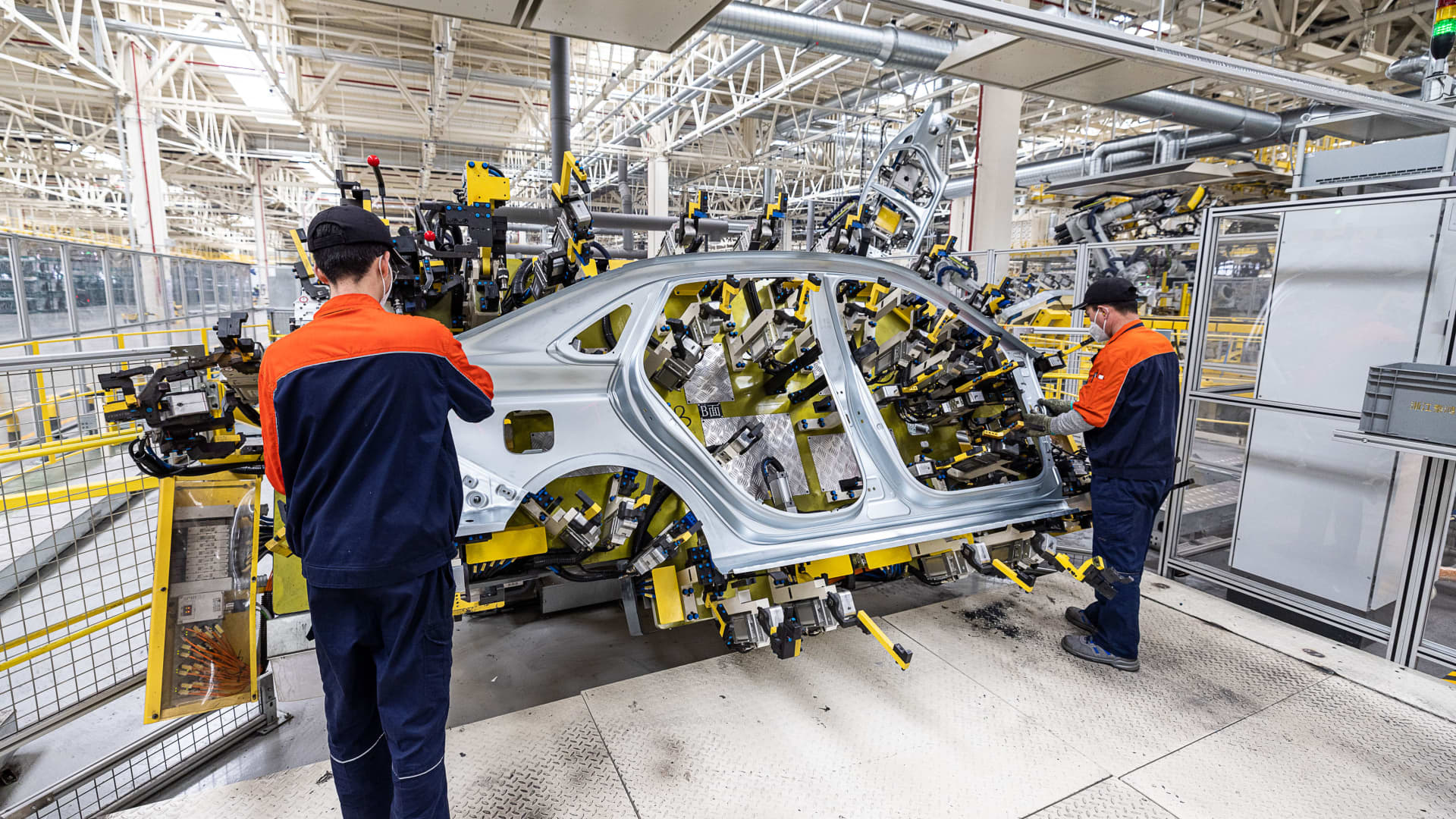- China currently dominates the electric vehicle, battery, and critical metals industries.
- However, other countries, such as Australia, India, and the US, have started pushing back against Chinese investment in these industries.
- There is suspicion and concern about Chinese EV companies in countries like France, which is calling for an investigation into unfair subsidies by the Chinese government.
- This could potentially lead to new tariffs on Chinese EV imports to the EU.
- China's recent actions, such as threatening to curb exports of important materials and banning coal imports from Australia, have further fueled concerns about dependence on China.
Shares of Chinese automaker BYD listed in China surged over 5% following a significant jump in first-half profit, driven by record deliveries and growth in the new energy vehicle business, with revenue increasing by 72.72% compared to the same period last year.
The article discusses the potential for the West to use China's economic slowdown to gain an advantage in the electric car race, highlighting the need for a different approach to counter China's advantage. The author suggests welcoming Chinese investment and immigration of skilled Chinese scientists to strengthen the American EV industry and potentially weaken China.
China has announced new guidelines to boost car sales, with a focus on new energy vehicles, aiming to sell around 27 million new vehicles this year and increase sales of electric cars to approximately 9 million units, as the country looks to revive its post-Covid economy.
Chinese companies have increased their presence in cutting-edge materials and electric vehicles, making it challenging for other countries to reduce their dependence on Chinese supply chains, despite protectionist measures.
Europe's carmakers are facing a tough battle to catch up with China in the development of affordable and consumer-friendly electric vehicles, with Chinese EV makers already a generation ahead, according to industry analysts and executives at Munich's IAA mobility show.
Chinese electric vehicle maker Xpeng plans to expand into more European markets, including Germany, Britain, and France in 2024, following its successful entry into the Netherlands and Norway.
Chinese car makers BYD and XPeng saw their stock prices rise ahead of a major auto show where they will compete with Tesla, which is making its first appearance at the event in Munich.
Lucid is exploring the possibility of entering the Chinese electric car market, but has not yet set a timeline for its entry, according to a top executive at the company. Lucid recognizes China as the world's largest and fastest adopting EV market, but wants to ensure it enters on the right terms to avoid mistakes. The company is currently assessing the viability of entering the market and considering factors such as pricing and manufacturing strategy. Additionally, Lucid plans to expand its product range to include lower-priced vehicles, with a mid-sized car potentially being unveiled in 2026. However, entering the mass-market segment will take time and require a strong supply base and the right pricing.
China's passenger vehicle sales experienced growth in August, driven by discounts and tax breaks on environmentally friendly and electric cars, despite a weak economy, and Tesla's share of the Chinese electric vehicle market nearly doubled.
The European Commission has launched an investigation into whether to impose punitive tariffs on Chinese electric vehicle (EV) imports that it considers to be benefiting from state subsidies, as the Chinese share of the European EV market has reached 8% this year.
The European Union is investigating China's state support for electric vehicle makers due to concerns about the impact on European auto manufacturers, with Chinese companies already gaining a substantial market share in Europe through cheaper prices and subsidies.
China accuses the European Union of "blatant protectionism" following an "anti-subsidy" investigation into China's electric vehicle makers, posing a threat to China-EU trade relations and potentially leading to tariffs on Chinese EVs.
The European Union and China are in a dispute over electric vehicles, which could potentially benefit auto stocks in the short term and have negative consequences for diplomatic relations.
German carmakers are concerned about potential retaliation if the EU imposes duties on Chinese electric vehicles, according to German Economy Minister Robert Habeck, who also acknowledged a Franco-German divide over the anti-subsidy probe.
Automobile manufacturers are urging the EU to postpone a 10 percent tariff on electric vehicle exports to the UK, as the European car industry is still heavily reliant on components from China and other countries to meet demand, and the tariff could cost EU manufacturers €4.3 billion and result in a reduction in vehicle production.
The European Commission has launched an investigation into Chinese electric vehicle subsidies, which will be fact-based and conducted in accordance with EU and WTO rules.
China's commerce minister expressed dissatisfaction with the European Union's decision to launch an anti-subsidy investigation on China's electric vehicles, calling it a protectionist act that will affect China-EU green cooperation and the global automotive industry.
The rise of electric vehicles in China is causing a shakeout in the auto market, with midsize automakers struggling to compete with local rivals and the government supporting select companies in its bid to become an automotive powerhouse.
Chinese electric-vehicle maker BYD surpassed Tesla in global EV production for the first time.
The European Commission has initiated an anti-subsidy investigation into Chinese electric vehicles, which could potentially lead to the imposition of tariffs on imports from China within the next 13 months.
The European Commission has opened an investigation into China's electric vehicle sector, citing evidence of subsidies that could harm the EU industry and potentially result in import duties on vehicles from China.
Car sales in China increased 4.7% in September, driven by discounted and new models ahead of holidays, with new energy vehicle sales growing 22.1% and accounting for 36.6% of total car sales.
